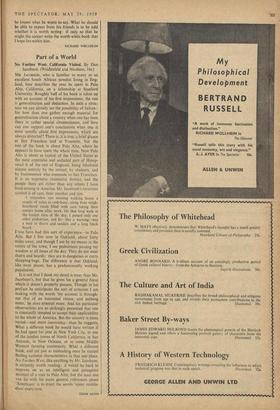Part of a World
MR. JACOBSON, who is familiar to many as an excellent South African novelist living in Eng-
land, here describes the year he spent in Palo Alto, California, on a fellowship at Stanford University. Roughly half of his book is taken up with an account of his first impressions; the rest is generalisation and deduction. In such a struc- ture we can already see the possibility of failure:
for how does one gather enough material for generalisation about a country when one has been there in rather special circumstances, and how can one support one's conclusions when one is most specific about first impressions, which are always distorted? There is, it is true, a brief glance at San Francisco and at Yosemite, but the rest of the book is about Palo Alto, where he appears to have spent the whole time. Now Palo Alto is about as typical of the United States as the most expensive and secluded part of Hamp- stead is of the rest of England, being inhabited almost entirely by the retired, by students, and by businessmen who commute to San Francisco. It is an expensive residential district, and the people there are richer than any *others .I have lived among in America. Mr. Jacobson's recurrent symbol is of cars, their number and size.
I remember one evening walking home a couple of miles at rush-hour, along busy neigh- bourhood roads filled with cars taking their owners home after work. On that long walk at the busiest time of the day, I passed only one other pedestrian, and he—like a warning—was a man in shorts and sandals and a long black beard.
l-too have had this sort of experience—in Palo Alto. But I live now in Oakland, about forty miles away, and though I am by no means in the centre of the town, I see pedestrians passing my window at all times of the day. They do not wear shorts and beards: they are in dungarees or carry shopping-bags. The difference is that Oakland, like most places, has a predominantly working population.
It is not that I think my detail is truer than Mr. Jacobson's, but that he gives his a general force which it doesn't properly possess. Though in his preface he anticipates the sort of criticism I am making with the words 'my account is through- out that of an interested visitor, and nothing more,' he does attempt more. And his particular observations are so strikingly presented that one
is constantly tempted to accept their applicability
to the whole of America. But the country is more varied—and more interesting—than he suggests.
What a different book he would have written if
he had spent his year in New York City, in one of the lumber towns of North California, in San
Antonio, in New Orleans, or in some Middle
Western farming community. What a different book, and yet just as misleading once he started
finding national characteristics in that one place.
No Further West, like anything by Mr. Jacobson, is certainly worth reading : it would be hard to improve on as an intelligent and perceptive account of a visit to Palo Alto; but the least one can do with his more general references about 'Americans' is to insert the words 'upper middle- class' every time.
THOM GUNN














































 Previous page
Previous page